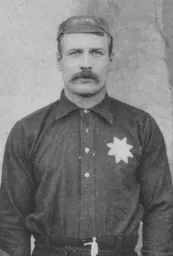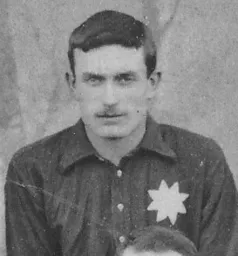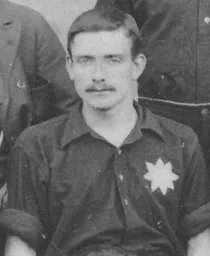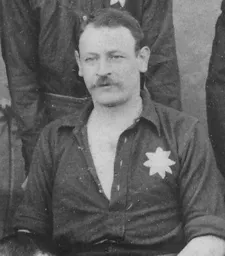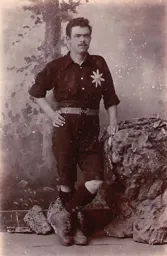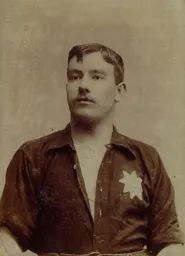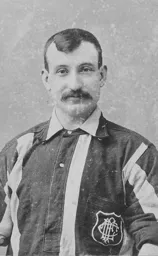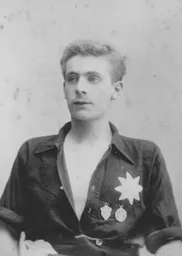The Luton Reporter -
“On Saturday last the Luton Town men journeyed to Colchester in order to meet the Sherwood Foresters in the final round of the qualifying contest for the English Cup. Efforts had been made to induce the Army players to visit Luton, but these overtures were declined when the Bedfordshire men had refused to play at Derby. It may be well to intimate that the rival teams had met four times previously and that honours were even. Last season Luton won the rubber with two games out of three, and this season the soldiers obtained the victory by three goals to one in the solitary encounter which had taken place. Under these circumstances it was considered that the struggle would be singularly keen, though there was a general leaning towards the chances of the strangers when it was ascertained that the Lutonians would be compelled to play away from home. The members of the eleven made the long and tedious journey to the Eastern garrison town on Friday night, and were accommodated at an excellent Temperance hotel. On Saturday morning they were followed by about 30 townspeople, who reached Colchester in comfortable time. Here they found the Luton representatives in excellent spirits and with a firm belief in their ability to win. The weather was brilliant in the extreme, the sun shining strongly during the day, and the lot of the spectator was the reverse of unpleasant in consequence. The scene of the encounter was Colchester Town Club’s private ground in Cambridge-road, and at the time announced for the start there was a fairly large crowd lining the ropes, the number being about 1,500. The military were well in evidence, for not only were a goodly proportion of the onlookers wearers of uniform but the ground was kept by a picket.
Shortly after 2 o’clock the teams made their appearance, and at 2.15 they lined up in the following order :—Sherwood Foresters : Goal, Pte. Cragg ; backs, Sergt. Pykett and Pte. Bacon ; half-backs, Pte. Shaw, Drummer Garton, and Pte. Whitehead ; forwards, Drummer Potter and Pte. Legge (right wing), Pte. Roberts (centre), Sergt. Hoare and Pte. Vernon (left wing). Luton Town : Goal, E. Bee ; backs, J. Wilson and W. Chesher ; half-backs, A. H. Taylor, J. W. Julian (captain), and J. Watkins ; forwards, W. Brown and J. Finlayson (right wing), H. Galbraith (centre), F. Allen and J. Dimmock (left wing). The referee was Mr. G. B. Kemp, and the linesmen were Sergt. Corrigan (Foresters), and Mr. E. A. Barford (Luton). The visiting captain won the toss and set his opponents to play with the sun in their faces, though they had the advantage of a somewhat strong wind. Directly after the commencement the Lutonians worked their way into the quarters of their adversaries, but a capable spurt by the soldiers’ left wing effected a clearance, and so splendidly did the pair travel that Taylor was forced to kick out. A goal-kick enabled Luton to carry the play into mid-field, but the military came down in force again, and were only stopped by handling the ball near the Luton goal. Dimmock at this stage of the game distinguished himself by making a grand single-handed run, and thereafter a series of throws-in from touch enabled the “reds” to work their way up the line. The home backs broke up the attack, however, and transferred the operations to the centre of the ground, where hands against the Sherwoods afforded their opponents some relief. The soldiers were playing a hard, dashing game, and not only were they kicking hard and often, but their heading was magnificent. Wilson came through in capital fashion on one occasion, but the Foresters rallied and again attacked. The first corner in the game fell to them, but it was resultless, Potter kicking badly. Again the homesters swarmed to the attack, but they found the Luton defence far too sturdy. Galbraith soon afterwards took a long shot at Cragg’s charge, and the military custodian had an exceedingly difficult task to preserve his charge from downfall. Some exceedingly pretty and effective passing between Allen and Dimmock was next witnessed, the young left wing pair easily eluding the opposing half-backs. Dimmock ended by sending the ball over the line. Watkins was penalised for pushing one of the Army men with his hands, and the home combination managed to force their way into the Luton confines. Hands against Julian close in goal looked ominous for the visitors, but Bee exerted himself satisfactorily and his fortress remained uncaptured. Wilson immediately afterwards disposed of a tremendously hot attempt. Despite excellent defence, however, the Luton colours were lowered a minute or two later. A capital shot was sent in from the left wing and after a struggle the ball was forced through, Bee being knocked down by Roberts. The sympathisers with the soldiers set up a jubilant shout, and the Luton section of onlookers appeared correspondingly glum. The “reds” were by no means daunted by this reverse, for they came down the field in fine style and looked very much like scoring, but the Sherwood backs were strong as towers. The leaders sent in admirably, and a corner to them followed. An anxious time was experienced by the Lutonians just now, for the Foresters were playing grandly and were pressing in most determined fashion. The ball was no sooner forced over the line than another corner was obtained, but the ball was steered round the back of the net. Dimmock got possession and raced away to the other end, his tricky tactics being generally admired. A throw-in further increased the visitors’ advantage, and Pte. Cragg and the backs had all their work cut out to prevent the smart Luton pack from scoring. The game continued in the neighbourhood of the soldiers’ posts for a couple of minutes, when a goal-kick relieved. The “reds” again commenced a siege, however, and Brown sent in a first-rate centre, which Allen unaccountably failed to improve upon. The Foresters, who were being continually cheered by their supporters, continued to play a very fast game. They were at length pulled up for an infringement of the off-side rule, and Brown sent in another beautiful centre. Dimmock was punished for getting off-side, and thereafter Allen headed in well, Cragg experiencing great difficulty in foiling the little left winger’s attempts to score. The visiting side were now having all the best of matters, and repeatedly the soldiers’ citadel was only saved from downfall by the excellence of their back division. Dimmock sent in a capital shot which went about a yard on the wrong side of the post, and then a corner was won. It should here be mentioned that the Luton backs had been playing a grand game, their kicking being very sure. When the “reds” appeared certain to equalise, the Sherwoods broke away and coming down with a rush Hoare put his side further ahead with a shot which no goalkeeper could have kept out. Brown a minute later sent the ball over the bar at Cragg’s end after a good pass. Roberts very badly fouled Finlayson and was cautioned by the referee. When the leaders had struck the side of the net with the ball, their backs were given a great deal to do, the Luton forwards pressing continuously. A corner fell to the share of the “reds,” and hands was against the Foresters. Wilson was temporarily disabled, but luckily for his side the injury proved to be the reverse of serious; he had been playing grandly, and his kicking was frequently applauded. A foul against Luton resulted in Bee getting a handful from the opposing forwards, but he managed to stave off evil effects. Dimmock made a capable run along the line, but he was stopped in good time by one of the rear-guard. When the midway stage was reached the score remained unaltered, the figures reading: Sherwood Foresters, two ; Luton, none. With the wind in their favour in the second half the Bedfordshire lads went off at a great pace, and immediately after the re-start Brown was presented with a good chance, but Garton profited by his dallying and robbed him. The soldiers retaliated with a determined rush, but this was quickly stemmed and the Luton forwards again threatened danger. Bacon, who had been as strong as a rock and well-nigh as immoveable, relieved, and then hands against Julian gave a chance to the Foresters which they did not accept. Hereabouts the leaders got through, but only to be called up for off-side. Luton attacked very hotly, and after the ball had been kicked over the bar a foul was awarded against Watkins, who was told that he must keep his hands down. From a free kick for hands Galbraith passed out to Brown, who sent the leather past Cragg into the net at a terrific speed. This success was generally cheered, and it seemed to infuse additional spirit into the Luton players, for their exhibition was subsequently noticeably more brilliant than formerly. Potter made a good attempt to increase the advantage of his side, but Bee was equal to the emergency. The Foresters seemed to have developed an unwelcome liking for getting off-side, for they were again penalised for that offence. Luton here were having greatly the best of the exchanges, but Chesher was punished for fouling. This merely served as a temporary check, however, for almost at once the Lutonians were again making things lively for Cragg, their luck being of the worst possible description. Dimmock was slightly hurt, and Bacon fouled Brown, while a second foul was chronicled against the Sherwoods in a few minutes. Galbraith for once managed to elude the vigilance of the defenders, who were very carefully watching him, and he sent in a shot which struck the cross-bar and re-bounded. A foul against the Foresters was followed by hands ten yards from their goal, and Cragg saved marvellously when a score seemed inevitable. The soldiers’ keeper was called upon by Brown, but acquitted himself equally satisfactorily. After a lengthy period of hard luck the Lutonians managed to equalise after an exciting struggle in front of goal. This success was received by the Luton portion of the crowd with enthusiastic applause. A fierce attack on the Luton posts followed, but nothing resulted. Julian was slightly injured, and subsequently hands was awarded against Roberts. When time arrived there was no further alteration in the positions, the sides being on equal terms with two goals each. Changing ends a second time the visitors made it apparent that they had played out their opponents, but the Foresters’ backs were very reliable and prevented them scoring. Luton experienced terribly hard luck more than once, and Potter was similarly unfortunate, while everybody wondered how Bee managed to keep out a tremendously hot attempt by Roberts. A corner to Luton having seen recorded, Dimmock managed to get through in good style, but he shot exceedingly badly. Wilson conceded a corner, and goal-keeper Bee maintained his excellent record. A corner on either side of the Luton posts was obtained by the Foresters, and shortly afterwards the first of the extra quarters was completed. No sooner had the teams again faced the centre line than a general outburst of cheering hailed another score by Brown, this giving Luton the lead. Thereafter the ball appeared to pass through the Sherwood posts and the Lutonians claimed a fourth point, but this was disallowed by the referee, though it was practically certain that it as a legitimate point. When only six minutes remained for play the referee stopped the game, asserting that he could not follow the ball owing to darkness. This decision was loudly challenged by the players, and indignantly protested against by the majority of the spectators; but the official was inexorable, and what was in reality a win for Luton has to be written down as a draw. As a commentary on the decision it may be stated that 10 minutes after play ceased it was possible to see from one end of the ground to the other with ease, and the sympathy of the crowd with the Luton players was betokened by the loud cheering which accompanied their progress through the town. Of course the match will have to be re-played, and the Foresters are ordered to visit Luton to-morrow, when the battle will be exceedingly keenly fought. The Luton men covered themselves with honours, all alike performing brilliantly. The backs were the strongest point of the Sherwood’s game.”

